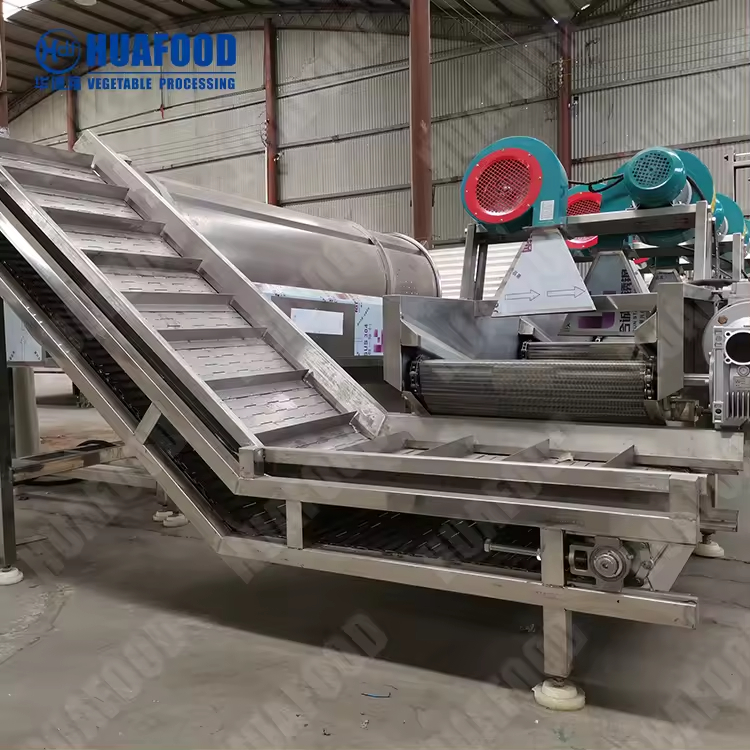Whether you’re managing a sprawling farm, overseeing operations in a bustling large-scale restaurant kitchen, or running a massive processing plant, ensuring the cleanliness and quality of vegetables is crucial. This is where a vegetable wash line becomes indispensable.

Understanding the Needs of Different Sectors—Vegetable Wash Line
1. Farms:
– Efficient Cleaning: Farm operators need to efficiently clean freshly harvested vegetables before distribution. A vegetable wash line ensures thorough cleaning without damaging the produce.
– Adaptability:** Farms often deal with a variety of vegetables, from leafy greens to root vegetables. A wash line should be adaptable to handle different types of produce effectively.
– Scalability: As farms grow, the ability to scale up production becomes essential. A vegetable wash line that can accommodate increased volumes without sacrificing efficiency is invaluable.
2. Restaurants à grande échelle:
– Bulk Processing: Large restaurants require equipment capable of processing vegetables in bulk to meet the demands of high-volume cooking. A vegetable wash line with a high throughput is essential for efficient kitchen operations.
– Food Safety Compliance: Maintaining stringent food safety standards is imperative for large-scale restaurants. A vegetable wash line equipped with sanitation features helps ensure compliance with regulations and safeguards against foodborne illnesses.
3. Processing Plants:
– Volume Handling: Large-scale processing plants deal with immense volumes of vegetables daily. A vegetable wash line equipped to handle high volumes efficiently is essential for uninterrupted operations.
– Customization Options: Different vegetables may require specific cleaning methods. Processing plants benefit from wash lines that offer customization options to suit diverse needs.
– Integration with Production Line: Seamless integration with existing production lines is crucial for processing plants. A vegetable wash line that seamlessly fits into the workflow enhances overall efficiency and productivity.
Tailoring Vegetable Wash Lines for Different Produce
1. Leafy Greens:
-Gentle Washing: Leafy greens are delicate and require gentle washing to avoid bruising or tearing. Washing lines with bubble wash or gentle water jets ensures thorough cleaning without causing damage.
– Sanitization: Leafy greens are often consumed raw, making thorough sanitization a priority. Our vegetable washing line comes with an ozone generator, to enhance food safety.
2. Légumes-racines:
– Tough Cleaning: Root vegetables like carrots and potatoes may have stubborn dirt or debris adhering to their surfaces. A wash line with powerful jets or brushes can effectively remove such contaminants.
– Root Vegetable Specific Features: Some wash lines offer features such as adjustable water pressure to accommodate the varying surface textures of different root vegetables.
3. Fruits:
-Delicate Handling: Fruits like apples, baies, and tomatoes require delicate handling to prevent bruising or skin damage. Opt for wash lines with adjustable settings to ensure gentle cleaning.
– Drying Options: After washing, fruits or vegetables need to be adequately dried to prevent spoilage. Our fruit and vegetable washing lines come with an integrated drying system for a seamless transition to the next processing stage.
Investing in a ligne de lavage de légumes is a strategic decision for farms, large-scale restaurants, and processing plants alike. By understanding the specific needs of each sector and tailoring wash line features accordingly, businesses can streamline operations, enhance food safety, and maintain high-quality standards. Whether it’s handling leafy greens, root vegetables, or fruits, a well-designed wash line is the cornerstone of efficient vegetable processing on a large scale.
 Machine à laver les légumes
Machine à laver les légumes